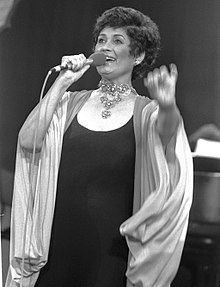Yafa Yarkoni
Yafa Yarkoni ( Hebrew יפה ירקוני; born December 24, 1925 in Giv'at Rambam; died January 1, 2012 in Tel Aviv , also Yaffa Yarkoni or Yarqoni ) was an internationally known Israeli singer . In 1998 she won the Israel Prize .
Life
First steps
Yafa Yarkoni was the second of three siblings as Yafa Abramov in Giv'at Rambam, now a suburb of givatayim around Tel Aviv . Her parents were mountain Jews and immigrated to Palestine from the Caucasus . Her father, a carpet dealer, later left the family and settled in South Africa, whereupon her mother opened a coffee house in Givatajim. Yafa's artistic career began at the age of ten as a member of the ballet troupe of Gertrud Kraus (1901–1977), a pioneer of modern dance in Israel. The young Yafa performed as a dancer in her mother's café.
Her first husband, Joseph Gustin, whom she married in September 1944, died in March 1945 as a member of the Jewish Brigade in the Italian campaign during World War II. She immediately gave up her ballet career because of a foot injury. In 1948 she married Shaike Yarkoni.
Career as a singer
In 1948 she served in the Hagana in messaging. She was then accepted into the military band of the newly founded Giv'ati Brigade , where she sang Bab el Wad , a song in memory of the battles of Sha'ar HaGai in the War of Independence . Since then, the song has been heard every year on the commemoration day of the fallen Israeli soldiers and victims of terrorism and on the following Independence Day .
In the 1950s, Yarkoni made a name for herself as an interpreter of salon songs in waltz rhythm on Israeli radio . She also sang some of Naomi Schemer's early nursery rhymes and was one of the first to perform the love song Erev schel Shoshanim in 1957 . At that time, she was often accused of having an invented rivalry with the popular singer Shoshana Damari in the press . In the 1960s she achieved international fame with performances in London, Paris, Carnegie Hall and Lincoln Center in New York . She won first place at the Israeli Song Festival in Jerusalem in 1965 and was able to repeat her success a year later with the song Lel Stav ("Autumn Night"), which was also interpreted by Arik Einstein . In 1998 she was awarded the Israel Prize for Israeli Music.
Yarkoni made hundreds of appearances in front of Israel Defense Forces soldiers . In the numerous wars she often appeared at the front and was therefore called the “singer of wars” - a term she was reluctant to hear.
Politically, she identified with the Zionist left and did not shy away from expressing her opinion publicly. In 2002, when Israeli soldiers numbered the arms of Palestinians during Operation Schutzschild , they recalled the Shoah on the Galei Zahal army station and asked, “How can we do such things?” A storm of indignation arose in the press , She received numerous threatening letters and a concert with her had to be canceled. In 2006 a gala evening was held in honor of Yarkoni at the Charles Bronfman Auditorium in Tel Aviv.
She had three daughters with Schaike Yarkoni, a commander of the Hagana, whom she married in 1948, and Yarkoni died in 1983.
After suffering from Alzheimer's disease for years, Yarkoni died on January 1, 2012 in a hospital in Tel Aviv. Both President Shimon Peres and Prime Minister Benjamin Netanyahu published honorable obituaries. She is buried next to her husband in the Kiryat Shaul cemetery.
Individual evidence
- ^ Obituary, The Jerusalem Post, January 1, 2012
- ↑ List of the 1998 award winners (Hebrew)
- ↑ Obituary Los Angeles Times
- ^ Obituary Jüdische Allgemeine
- ^ Obituary, The Jerusalem Post, January 1, 2012
Web links
- Singer Yaffa Yarkoni died Jüdische Allgemeine , January 5, 2012
- Yaffa Yarkoni dies at 86 Los Angeles Times January 2, 2012
| personal data | |
|---|---|
| SURNAME | Yarkoni, Yafa |
| ALTERNATIVE NAMES | יפה ירקוני (Hebrew); Yarkoni, yaffa; Yarqoni; Abramov, Yafa (maiden name) |
| BRIEF DESCRIPTION | Israeli singer |
| DATE OF BIRTH | December 24, 1925 |
| PLACE OF BIRTH | Giv'at Rambam |
| DATE OF DEATH | January 1, 2012 |
| Place of death | Tel Aviv |
